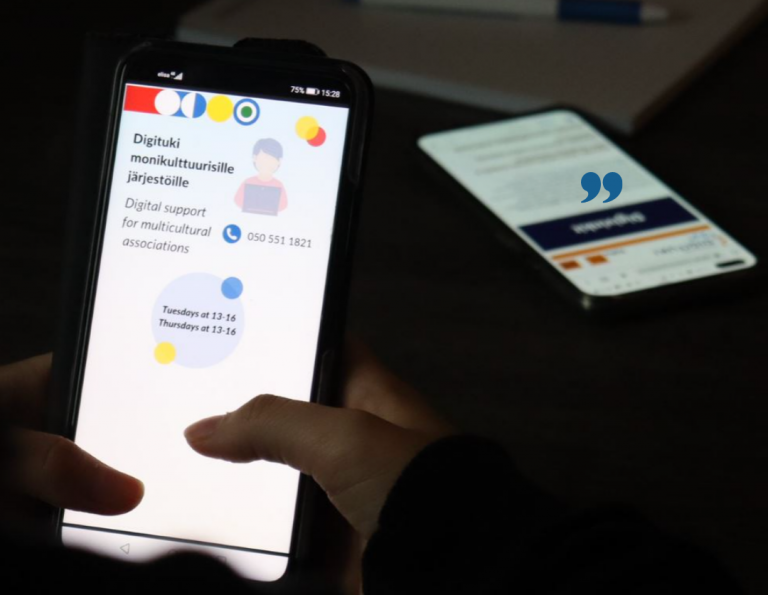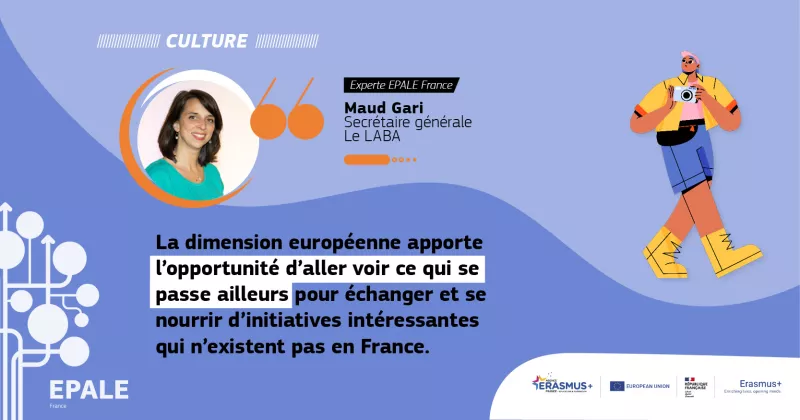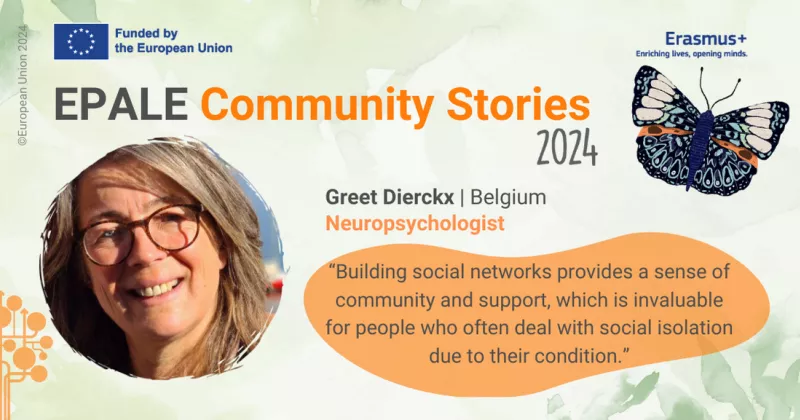Artëm Kuosti & Yuri Kitaba: Digitalisation is for everyone – or is it?

While Finland is an international leader in digital skills and digitalisation, not everyone can keep up with the digital transformation. Some NGOs had to suspend their work during the COVID-19 pandemic due to a lack of skills, digital devices and resources.
Finland is often showcased as one of the leading countries in the field of digital skills, internationally and in studies (Digibarometer). The status of digitalisation in Finnish NGOs has been studied extensively, for example in Järjestödigi surveys conducted since 2017 on and the Digital and Population Data Services Agency’s (DVV) digital skills survey (2020). The field of digitalisation and digital support in Finland has clearly advanced. However, one vulnerable target group can be easily excluded in surveys of digital skills.
How can we make sure that everyone can keep up with the digital transformation?
Gaps in digital inclusion in Finland
Moniheli is a Finnish multicultural network with more than a hundred member organisations. Through our members, we have built a comprehensive picture of the level of immigrants’ digital skills and digitalisation in multicultural NGOs. We have noticed that these groups are often excluded from studies and surveys related to digital skills.
In the DigiUp project, we mapped out the situation of digitalisation in multicultural NGOs. We looked at the situation of NGOs and communities from the perspective of promoting digitalisation. This NGO survey carried out in seven languages reached 43 organisations and highlighted the fact that NGOs cannot keep up with the rest of society in digital development.
Clients of advisory services often have inadequate skills in reading Finnish language and society, which prevents them from understanding the language, symbols and culture used in forms. In order for them to use services, time, repetitions and versatile interaction as well as competence are required to help them understand and internalise officialese, the concepts used, and the Finnish operating culture. Individual needs and obstacles to learning must also be taken into consideration.
- Raisa Lindroos, General Secretary, Filoksenia Association (MoniDigi mapping)
For many, digital environments, services and forms are completely new concepts. There are major differences between the service cultures in different countries. It should be noted that for many, digital services are the first contact with Finnish society, which is why individual guidance is essential for strengthening their sense of inclusion and civic literacy.
It is also important to recognise the different needs of people in various stages of integration. Immigration is a stressful process and involves integration stress, to which people are exposed in different ways depending on their personal skills levels. Digital skills and literacy play a key role in the causation of integration stress.
The fundamental rights of all immigrants are not realised, as not everyone has equal access to devices, network connections and banking IDs. The role of NGOs is emphasised in situations where immigrants face challenges in orientation to society. NGOs often become close and important communities for immigrants by providing them with support accessibly, multilingually and with cultural awareness.

Photo: DigiUp project, Moniheli
For many, digital environments, services and forms are completely new concepts. There are major differences between the service cultures in different countries. It should be noted that for many, digital services are the first contact with Finnish society, which is why individual guidance is essential for strengthening their sense of inclusion and civic literacy.
It is also important to recognise the different needs of people in various stages of integration. Immigration is a stressful process and involves integration stress, to which people are exposed in different ways depending on their personal skills levels. Digital skills and literacy play a key role in the causation of integration stress.
The fundamental rights of all immigrants are not realised, as not everyone has equal access to devices, network connections and banking IDs. The role of NGOs is emphasised in situations where immigrants face challenges in orientation to society. NGOs often become close and important communities for immigrants by providing them with support accessibly, multilingually and with cultural awareness.
Situation of digitalisation in multicultural NGOs and their societal role
Our survey found that NGO actors are willing and motivated to try out new possibilities in the digital environment. However, there are many areas of development and challenges. Key challenges include inability to use devices and lack of digital competence as well as hidden digital support.
Many small NGOs had to suspend their activities during the COVID-19 pandemic due to the restrictions in place. The reason for this was a lack of skills, devices and resources. Even if NGOs had had the capabilities to move their activities to online platforms, the members of their communities might not have been able to participate in remote activities. The target groups of the activities do not have the required skills and devices or knowledge of online environments. Familiarisation with online environments requires repetition and patience, as well as individual guidance, which in turn requires time and human resources. Such additional guidance and advisory work, which is a prerequisite for fulfilling the NGO’s main activities, is called hidden digital support. It significantly increased the NGOs’ workload during the pandemic.
The DigiUp project has supported our association in organising digital learning for our members. It has been highly necessary, and it has been used a lot in anything related to e-services.
- The DigiUp project’s client feedback on digital support for NGOs.
Conventional face-to-face advice and physical access to services should be maintained. The operating cultures, needs and attitudes of NGOs and communities should be taken into account in efforts to promote digitalisation. Multicultural NGOs have a great deal of competence and understanding related to the current needs of the communities they represent, which is why by involving NGOs in the planning of change, we will strengthen the overall digital inclusion of society.
Digitalisation should not contribute inequalities in society. Orientation to society cannot take place exclusively by digital means. The realisation of a citizen's rights must not depend on their digital skills.

Photo: DigiUp project, Moniheli
Authors:

Artëm Kuosti has a background in community education as well as many years of experience of voluntary work with immigrants in a vulnerable position and advice provision in NGOs. Artëm Kuosti works as the DigiUp project’s Project Manager in Moniheli.
Yuri Kitaba is a Master of Social Sciences. He works as the Project Coordinator in the DigiUp project, in which she offers low-threshold digital support for multicultural organisations and assists them in operating in a digital environment.
Read more
MoniDigi mapping, 2021: Our survey looked at digitalisation, digital skills, communication and digital support in the field of multicultural NGOs. With the help of the survey, we can make immigrants’ viewpoint visible in the digitalisation and development of society. LINK (17 February 2022)
***
The Freedom and Responsibility of Liberal Adult Education (SVV) programme published a blog by the name Sivistystori in 2021. In this blog, researchers and experts of liberal adult education and SVV’s partners with an interest in general knowledge and education write about educational work and the importance of general knowledge and education in society.




